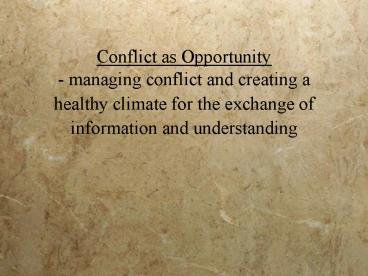Conflict as Opportunity - PowerPoint PPT Presentation
1 / 27
Title:
Conflict as Opportunity
Description:
Learn to Look Crucial Conversations: Patterson, Grenny, McMillan, Switzler. 2002 Step out of the issue Check what aspect of safety is at risk - mutual purpose? mutual ... – PowerPoint PPT presentation
Number of Views:24
Avg rating:3.0/5.0
Title: Conflict as Opportunity
1
Conflict as Opportunity - managing conflict and
creating a healthy climate for the exchange of
information and understanding
2
- Mediation
- serious staff conflicts
- alternative to disciplinary action
- insider neutrals
- transferable skills
3
At ISP we believe that conflict is neither good
nor bad but natural. We seek to create an open
community, climate and culture that is able to
embrace diverse perspectives and approaches. We
expect differences to be expressed respectfully
and we intend for each member of our community to
develop the ability to listen to, hear and
acknowledge different points of view.
4
- Mediating serious interpersonal conflicts
- Creating a climate that deals openly with
conflict - Learning to become better at managing difficult
conversations and crucial confrontations
5
- Situations
- When did I handle conflict well?
- When did it go wrong?
6
Crucial Conversations Crucial Confrontations
7
- Talking to colleagues about offensive behaviour
- Critiquing a colleagues work
- Talking to a team member not keeping
commitments - Talking to a colleague about a personal problem
- Giving boss feedback about behaviour
- Approaching boss who is breaking own principles
8
Challenging conversations Why might it go
wrong? - design fault?
9
Reason and Emotion Fight or Flight? The Amygdala
10
Difference is. - how you respond when things
go wrong - how you handle difficult situations or
conversations
11
Conflict Behaviour Styles
12
Causes of Conflict . . .
Assumption Appreciation Acknowledgement Respect Re
sources
13
Active Listening Being Heard Positions v
Interests
14
- Assuming that others do things because its in
their make-up or they actually enjoy doing them
and then ignoring any other potential
motivational forces - is a mistake. - Psychologists classify this mistake as an
attribution error. And because it happens so
consistently across people, time and places, it
is called the - Fundamental Attribution Error
Crucial Conversations Patterson, Grenny,
McMillan, Switzler. 2002
15
- Me v You
- Situational v Dispositional
16
The Pool of Shared Meaning
17
Successful communication - free flow of
information
Freely shared feelings, opinions, theories -
even when controversial or unpopular
Safe for everyone to add their meaning to the pool
18
Crucial Conversations Patterson, Grenny,
McMillan, Switzler. 2002
19
Dark waters? Silence -
disengagement, avoidance, hints,
sarcasm
20
Violence verbal attacks, discrediting
others, subtle manipulation, getting others
to mistrust
21
Learn to Look
Monitor the pointers
Crucial Conversations Patterson, Grenny,
McMillan, Switzler. 2002
22
- Step out of the issue
- Check what aspect of safety is at risk -
- mutual purpose?
- mutual respect?
Make it safe!
23
- Fix it -
- Apologise
- Contrast to Clarify
- Find and Commit to a mutual purpose
- Return to the issue and brainstorm strategies
Make it safe!
24
Monitor the pointers
Crucial Conversations Patterson, Grenny,
McMillan, Switzler. 2002
25
Find your bearings..
- Start with the Heart
- Focus the Brain
- Master My Stories
26
- What do you really want to happen?
- What do you fear might happen?
- What emotions are you bringing to the dialogue?
- - guilt?
- - fear?
- - anger?
27
- Crucial Conversations Patterson, Grenny,
McMillan, Switzler. 2002 - Crucial Confrontations Patterson, Grenny,
McMillan, Switzler. 2005 - vitalsmarts.com
- The Mediation Handbook Beer, Stief.1997
- Mediation for Managers John Crawley, Katherine
Graham, www.conflictmanagementplus.com - The Fifth Discipline Fieldbook Senge, Kleiner,
Roberts, Ross and Smith. 1994































